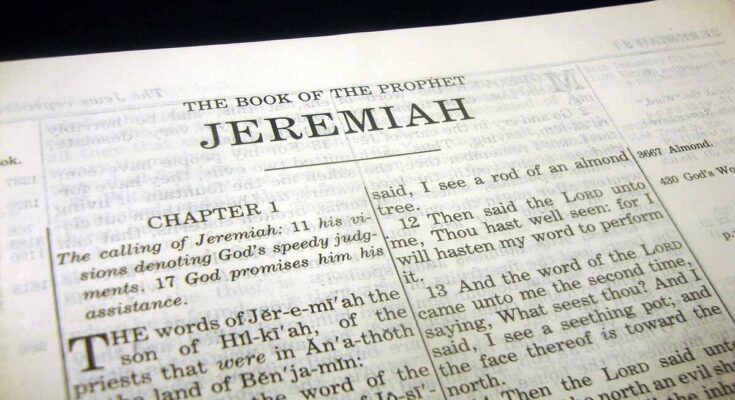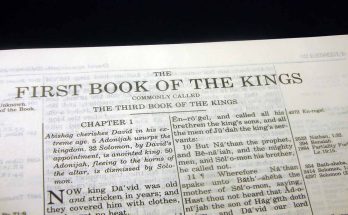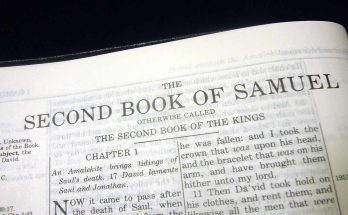Book of Jeremiah
In the book of Jeremiah, Jeremiah confronts many people with their sins: kings, false prophets, those at the temples, and those at the gates. A lack of response made Jeremiah wonder if he was doing any good at all. He often felt discouraged and sometimes bitter. To bring such gloomy messages to these people was a hard task. We too have a responsibility to bring this news to a fallen world: those who continue in their sinful ways are eternally doomed. Although we may feel discouraged at the lack of response, we must press on to tell others about the consequences of sin and the hope God offers. Those who tell people only what they want to hear are being unfaithful to God’s message.
Jeremiah lived to see many of his prophecies come true – most notably the fall of Jerusalem. The fulfillment of this and other prophecies against foreign nations came as a result of sin. This who refuse to confess their sin brings judgment upon themselves.
The basic theme of Jeremiah’s message is simple: “Repent and turn to God, or he will punish.” But then, because the people rejected his warning, Jeremiah moved to predicting, specifically the destruction of Jerusalem.
As you read the book of Jeremiah, feel with him as he agonizes over the message he must deliver, pray with him for those who refuse to respond to the truth and watch his example of faith and courage. Then commit yourself to be successful in God’s eyes.
Writer of the book of Jeremiah
Determining the authorship of the book of Jeremiah is complicated by several factors: the variety of types of literature found in the book, the differences between the Hebrew and Greek versions of the book, and the difficult lives Jeremiah and his scribe Baruch lived. However, these complications described do not make it impossible for the contents of the book to be Jeremiah’s words, as the Bible says they are (Jeremiah 1:1)
Date Written
It is impossible to know exactly when the book of Jeremiah reached its final form. Jeremiah certainly died within a decade or two of the last events recorded in the book, and the same is likely true of Baruch. Thus, the book was probably composed by 550 B. C.
To Whom Written
Judah (the southern kingdom) and it’s capital city, Jerusalem.
Historical Setting of the book of Jeremiah
The Book of Jeremiah belongs to a chaotic time in the history of God’s covenant people. Jeremiah’s native land, the southern kingdom of Judah, was caught in a power squeeze between three great powers of the ancient world: Egypt, Assyria, and Babylon.
Theological Contribution
Jeremiah’s greatest theological contribution was his concept of the new covenant. A new covenant between God and His people was necessary because the old covenant had failed so miserably.
Special Consideration in the Book of Jeremiah
Jeremiah was a master at using figures of speech, metaphors, and symbolic behavior to drive home his messages. He carried a yoke around his neck to show the citizens of Judah they should submit to the inevitable rule of the pagan Babylonians. He described a potter who marred a piece of clay, then reshaped it into a perfect vessel to teach submission; he purchased a plot of land in his hometown to symbolize his hope for the future.
Scripture Study Resources
ESV Study Bible – Study Bibles give you a deeper understanding of God’s Word with tools for life application like commentary, maps, charts, concordance, and study notes. Search our popular translations- NIV, ESV, NKJV, KJV and more!
Believer’s Bible Commentary: Second Edition – A Bible commentary is a written, systematic series of explanations and interpretations of Scripture. Commentaries often analyze or expound on individual books of the Bible, chapter by chapter and verse by verse. Some commentary works provide analysis of the whole of Scripture.
The New Strong’s Expanded Exhaustive Concordance of the Bible – The best concordance for word study! This exclusive new edition of a legendary classic puts generations of biblical research at your fingertips. A valuable tool for pastors, teachers, and students of the Bible.
Vine’s Complete Expository Dictionary of Old and New Testament Words – This classic word study resource allows you to study the meaning of biblical words in the original languages without spending years learning Greek or Hebrew. A great resource for students, seasoned pastors, and anyone who enjoys biblical word studies–even if they have little to no formal training in Hebrew or Greek.
Halley’s Bible Handbook – The beloved and classic Bible companion has been thoroughly updated, while retaining its time-honored features and Dr. Halley’s highly personal style, to offer even greater clarity, insight, and usefulness.
Click here to print or download the scripture outline on the “Book of Jeremiah: Turn Back to God“




